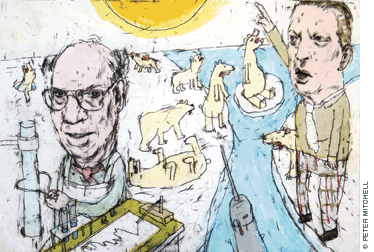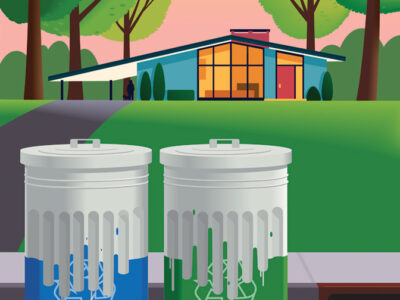
Scientists have theorized about the greenhouse effect since the 19th century, and today we are closer than ever to understanding the complex processes that sustain life on Earth. But the science of climate change is as complex as the politics are contentious. In recent years a sharp increase in levels of atmospheric carbon dioxide (CO2), a primary greenhouse gas, has aligned with rising global temperatures. This trend was explored in Al Gore’s provocative documentary, An Inconvenient Truth, which illustrated the potentially grave consequences with computer-rendered doomsday scenarios.
Professor Robert Giegengack, chair of the Department of Earth and Environmental Science, has a substantially different view on climate change. “I’m not telling anybody to not worry,” he explains. “I’m just unhappy about the way Gore presented it.” By using a minuscule timeframe and appealing to fear, Giegengack argues, Gore produced an inaccurate report, “a political statement [that] has to go head-to-head with what comes out of Washington or the American Petroleum Institute.” Giegengack contends that natural warming periods in our planet’s past have triggered the release of CO2 into the atmosphere from ocean- and land-based reservoirs, and that the most significant consequence of human fossil-fuel consumption is that we have altered that balance by pouring CO2 into the atmosphere and those terrestrial reservoirs simultaneously. Since that relationship has been disturbed, he says, even a drastic reduction in CO2 pollution may not restore the natural dynamic. The Gazette’s Carter Johns recently spoke to Giegengack about Gore’s film, climate-change science, and the environmental problems that really scare him.
What is your assessment of the threat global warming poses to the environment?
There are plenty of environmental problems out there; most of them are the consequence of a lot of people using a lot of energy. Global warming is a symptom of that fundamental problem. It’s one of many symptoms; it’s not the most severe. In terms of its capacity to cause the human species harm, I don’t think it makes it into the top 10.
What problem do you have with Gore’s film?
The advocates of change are now appealing to fear as brazenly as the proponents of business-as-usual. [The latter] tell us we can’t afford to cut back on our carbon emissions because it would destroy the economy. The other side says the world is going to hell and the polar bears are drowning. Both are extreme positions. Scientists have gotten tied up in this political argument because they were frustrated that the politicians weren’t paying attention to what they said. In order to make the message more apparent to the public, they’re exaggerating the risks. An Inconvenient Truth is a prime example.
What are some examples of these misleading statements?
He claims that temperature increases solely because more CO2 in the atmosphere traps the sun’s heat. That’s just wrong … It’s a natural interplay. As temperature rises, CO2 rises, and vice versa. Variations in planetary alignment are most likely responsible … When gravitation from other planets’ orbits causes the Earth to move closer to or further from the sun, temperatures increase or decrease. When we find that CO2 levels follow that directly, it’s hard for us to say that CO2 drives temperature. It’s easier to say temperature drives CO2.
How does that work?
Certain “feedback loops” naturally control the levels of greenhouse gases in the atmosphere. A warmer temperature drives gases out of solution in the ocean and releases them. Microorganisms in soil become more active; they chew up leaves and emit CO2. Permafrost melts near the poles and trapped methane escapes and flows into the atmosphere … [Today, humans] are putting 6.5 billion tons of fossil-fuel carbon into the atmosphere, and only 3.5 billion is staying there, so 3 billion tons is going somewhere else. In the past, when the Earth’s climate rose, CO2 came out of the ocean, the soils, and the permafrost. Today as temperatures rise, excess CO2 is instead going into those and other reservoirs. This reversed flux is very important. Because of this, if we reduced the rate at which we put carbon into the atmosphere, it won’t reduce the concentration in the atmosphere; CO2 is just going to come back out of these reservoirs … If we were to stop manufacturing CO2 tomorrow, we wouldn’t see the effects of that for generations.
Doesn’t he appeal to scientific opinion, though, in saying human carbon emissions are responsible for warming?
Gore mentions 928 recent articles, saying they all agree that warming is human-caused. However, the majority of them are reports such as [that] ice is receding. If I wrote an article about the rate of retreat of the permafrost and added, “By the way, this is caused by humans,” an editor would cut it out. When you write a scientific article, you don’t politicize. You just present the data. What he found in those articles is that nobody said warming isn’t the result of human activity. No one’s going to say that either. They are dispassionate scientific observations of what’s going on in the world.
What are some other misrepresentations or exaggerations that Gore makes?
He shows simulations of coastal lands flooding that would require a six-meter sea level rise. At [a standard rate of] two millimeters per year, that will take over 3,000 years. He didn’t say that. He shows pictures of drowning polar bears, but he doesn’t address the question of what the polar bears did in the last non-glacial period. Polar bears have been around through many of those cycles. Today as the ice melts, they have no place to go because we have compromised their habitats.
Why does Gore use “Since 1970…” as a frame for most of his arguments?
There was a global cooling episode that started in 1941, and lasted until about 1976; some people would say that the coldest time was about 1970, at which time it turned around and started to warm again. So for him it’s useful to put the time between 1970 and 2005 because you don’t have to worry about the fact that between 1945 and 1975 there was cooling. The best way to document the most drastic changes is to look only at those 35 years.
What has been the evolution of the politicization of environmental issues?
When I first learned about global warming in 1957, it wasn’t given a lot of political attention. In 1976 people were talking about it, but politicians didn’t pay any attention until about 1988. The Missouri River got so low that barges were stranded and trade traffic, which was a big part of the heartland economy, slowed considerably. There were huge fires at Yellowstone. As a consequence, politicians started to notice. They jumped on the bandwagon because there were political ends to be gained by laying the blame somewhere and being an environmental hero. The International Panel on Climate Change (IPCC) was established at the same time. The IPCC, UNESCO, and the National Science Foundation have spent a lot of money supporting climatic research. The issue has acquired the attention it didn’t have before 1988, and it deserves more attention. But if you’re one of the people whose future as a scientist depends on continued funding from one of these agencies, you’re not going to say ”My findings are uncertain,” or “It’s going on but I don’t think humans are at risk.” Data that represents the largest threat to human welfare and security is more likely to attract funding than a carefully worded scientific assessment. So I think that is a major factor: people pursuing what is in vogue.
What response have you gotten about your thoughts on the film?
People appreciated that I was drawing attention to the weaknesses in the film. Al Gore missed out on a really terrific opportunity with his name recognition, his access to these resources, and his pretty good understanding of climate processes. He could have put together a film that would have presented this problem in a rational context, and that would have been an enormous contribution. But he has abandoned the credibility of the scientific establishment. He missed the point in studying the cycles from prior periods, and he missed the point that it is the temperature that controls the CO2. Now, we have probably changed that because of the excess CO2 in the atmosphere, and we know or suspect that because we know we have reversed the flux. That’s probably the most significant finding: that we changed the way those systems operate.
So it’s not that Gore is wrong, but that he portrayed the “crisis” inaccurately?
He focused on fear. CO2 may make this change, but we’d like to be sure of that. And even if it does, he didn’t offer any solution, and neither has anybody else. He ignored the real threat, which is India and China, and he ignored other more immediate environmental problems.




